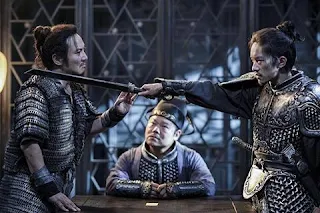 Director: Zhang Yimou
Director: Zhang Yimou'Full River Red' is a patriotic poem written by Yue Fei, a Chinese general during the reign of the Southern Song Dynasty. There was a time when the Jin Dynasty overpowered the Northern Song Dynasty from the area now known as Manchuria. Yue Fei was assigned to recapture the northern capital from the intruders. Just as he was about to overpower the invader, he was told to retreat.
The Southern King thought the released Northern King may have a claim to the throne. Yue Fei was called back to the southern capital, charged with trumped-up charges, and executed or died in prison. He was a victim of an internal political imbroglio. An established poet, Yue Fei wrote the poem to stir patriotic fervour among the people. It portrays his hatred towards the invading northern army and his frustration toward the peace accord with the Jin dynasty from the north. 'Full River Red' has become a masterpiece in the history of Chinese literature.
To put cold water into the sense of Chinese patriotism, a renowned Song scholar from Princeton, James T. C. Liu, says that the poem may have been written in the 16th century, looking at the words used. Yue Fei lived between 1103 and 1142! So, the poem may not be his at all.
As complicated as Chinese history was when we studied it in school, with similar-sounding names and convoluted turns of events, this movie follows the same trajectory. It should have occurred five years after Yue Fei's demise.
The Chancellor, who worked under the umbrella of the Southern Song emperor, had made a secret agreement with the Jin Dynasty representative. Yue Fei's supporters (the people) intercepted the papers by killing the Jin's messenger. The Chancellor had to prevent his maleficence from being out in the open. He assigns two men to find the culprit.
That snowballs into a sword unsheathing, head decapitating, violence-filled dark comedy. The film's climax is the poem's recital by all the prisoners. The entire army rises to the occasion with the inspiring patriotic hair-raising words of the poem.
This film turned out to be one of the highest-grossing Chinese movies. It is nothing more than using a common heritage to spur nationalism. But then, do they really share a common heritage when the People's Republic of China may be viewed as the rule of the Han people over other ethnicities like the Manchus, Uighurs, Tibetans, Mongols, and more. I am not sure whether the Chinese living in the areas bordering Central Asia and Tibetans share the same romantic views on a shared history.








.jpeg)























